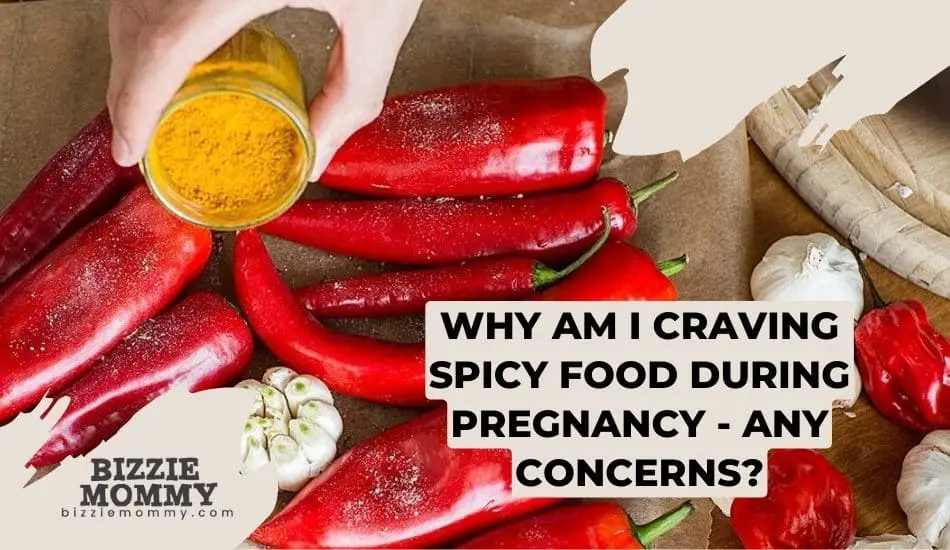When you are pregnant, you crave all kinds of things that sometimes make no sense. Many pregnant women have eaten pickles with ice cream, apple jam on sandwiches, and Italian sauce over canned tuna. In most cases, pregnancy hormones are responsible for this behavior. Despite myths on the internet, it’s hard to decode pregnancy cravings.
People think it happens more often if you’re having a boy, whereas others think it’s an instinct to cool down. It is widely believed that pregnant women experience cravings more often when they are carrying a boy because of higher levels of male hormones influencing their appetite. Others believe that cravings are the body’s way of getting pregnant women to consume food that contains certain essential vitamins and minerals that their growing baby needs.
It’s scientifically proven that sweat lowers your body temperature. Your baby’s taste buds are fully grown by the 15th week, and it begins ingesting amniotic fluid and tasting the foods you consume. Food cravings, especially for hot food, can also be caused by hormonal imbalances. You’re most likely to crave food when your serotonin and leptin levels are high. Eating spicy food has no uncomfortable side effects, but in some severe cases, it can upset the stomach of many pregnant women; however, heartburn is normal.
Is Craving Spicy Foods During Pregnancy Normal?
Yes, it is common for women to crave spicy foods. However, it is important to note that not all pregnant women experience pregnancy cravings, and cravings for spicy meals may vary from person to person. It is also imperative to make sure that the spicy food consumed is safe and not excessively hot to endanger one’s health.
Some women may like the flavour of spicy food, or it might relieve their morning sickness or other digestive problems that are prevalent during pregnancy. Despite this, it’s crucial to remember that eating spicy foods in excess when pregnant can cause heartburn or indigestion, so it’s preferable to consume them in moderation. Capsaicin, a substance in chilli peppers that is known to have anti-inflammatory qualities, is a component in spicy meals. This can lessen motion sickness and other intestinal problems. Additionally, the spice’s heat encourages the release of endorphins, which can contribute to a feeling of pleasure.
When consuming spicy foods while pregnant, as with any craving during pregnancy, it’s crucial to make sure it’s safe for you to do so. Contact your healthcare practitioner if you have any doubts.
Why Am I Craving Spicy Foods During Pregnancy?
It’s unclear why many women have a heightened taste for spicy foods. There are, however, several explanations:
- Hormonal changes: A woman’s hormone levels alter during pregnancy, which may impact her food cravings. Research shows hormonal fluctuations may make women more sensitive to flavors like spicy foods.
- Nutrient Deficiencies: Vitamin Cand Iron deficiency can cause pregnancy cravings. Pregnant women may have weird food cravings like hot sauce, sour foods, spicy foods, or sweet foods.
- Increased metabolism: Pregnant women may experience an increase in metabolism, which may make them yearn for spicy cravings.
- Psychological factors: Because pregnancy may be emotionally and mentally exhausting, some women may have spicy cravings to help them deal with stress or worry.
Though the precise causes of craving spicy food while pregnant are unknown, it is thought that a mix of hormonal and physiological changes in the body is to blame.
According to one theory, pregnant women crave spicy food because they contain ingredients that may assist in reducing morning sickness and other typical pregnancy-related stomach problems like gastroesophageal reflux and heartburn. It has been demonstrated that the chemical in chili peppers, capsaicin, gives its heat and also possesses painkilling and anti-inflammatory qualities, which may lessen intestinal discomfort.
Another idea contends that pregnant women may have a more acute sense of taste and smell, which may account for their cravings for spicy foods. Hormone changes can influence certain tastes and smell receptors, increasing sensitivity to specific flavors and scents. This may occur in the first trimester.
Some specialists assert that cultural and environmental influences may also cause the cravings for spicy meals during pregnancy. Spicy meals are often associated with specific cultural cuisines and may be more available or preferred in certain regions or households. It is important to note that while cravings for spicy food during pregnancy are common, they can also vary from person to person and may not be experienced by all pregnant women. It’s always a good idea to listen to your body’s cravings during pregnancy to maintain a healthy growing baby and a balanced diet.
Does My Baby Like Spicy Foods in the Womb?
As taste does not develop fully until the 2nd trimester, it is unclear whether or not a baby can taste spicy food or enjoy it. Around the 15th week of pregnancy, taste buds start to form, but they don’t fully develop until the second trimester.
The amniotic fluid in the mother’s uterus, however, may influence the palate preferences of the unborn child as a result of the mother’s diet throughout pregnancy. For instance, if a mother eats a lot of one food while pregnant, her unborn child may be more likely to favor that meal after birth. This is assumed to be the case because the mother’s breast milk and amniotic fluid expose the unborn child to the flavors of the meal.
Spices may alter your baby’s taste preferences if you eat spicy food during pregnancy. It is crucial to remember that this is still an active study area and that the precise mechanisms are not fully known.
Are There Any Effects of Eating Spicy Foods During Pregnancy?

It is considered safe for most pregnant to eat spicy food in moderation. But eating too many spicy meals can cause discomfort or bad things to happen, such as:
- Heartburn and indigestion: Spicy food can irritate the digestive system and cause heartburn and indigestion, common pregnancy symptoms.
- Hemorrhoids: Excessive consumption of spicy foods may cause the condition of hemorrhoids, which are characterized by swollen veins in the rectal region that can be painful and uncomfortable.
- Dehydration: Spicy foods can cause excessive sweating, leading to dehydration, which can harm both the mother and baby.
- Preterm: Some studies suggest that eating spicy foods when pregnant may make you more likely to go into early labor or have a premature baby, but the evidence is unclear.
Pros of Spicy Foods During Pregnancy
Moderate consumption of spicy foods when pregnant can have some potential benefits, including:
- Adding flavor and variety to the diet: Since appetites and taste preferences might alter during pregnancy, eating spicy food can satisfy a pregnant woman’s cravings for a particular taste and flavor.
- Increasing energy expenditure and metabolism: Capsaicin, the ingredient that gives chili peppers their heat, has been found to increase energy expenditure and metabolism, which may assist expectant mothers in maintaining a healthy weight during pregnancy.
- Reducing nausea and vomiting: Eating spicy meals may help to reduce nausea and vomiting, which are frequent pregnancy symptoms.
- Immune system stimulation: The numerous antioxidants and anti-inflammatory substances included in spicy foods can assist in strengthening the immune system and guard against infections and are beneficial for heart health.
- Supplying nutrients: Some foods, like chili peppers, are an excellent source of minerals and vitamins, including potassium and vitamin C, which are crucial for a healthy pregnancy.
Since every woman’s body and pregnancy are different, it is vital to remember that spicy foods may impact every woman in a different way.
Are Spicy Foods Safe for The Baby?
Moderate consumption of spicy meals in early pregnancy is generally considered safe for most women and their babies. On the other side, eating spicy meals in excess may make the mother uncomfortable or have negative consequences, which may indirectly impact the baby.
Furthermore, some research indicates that eating spicy meals while pregnant may raise the likelihood of early labor or delivery. Due to the ambiguity of the results, further study will be necessary to understand the possible risks.
It is crucial to ensure that the spicy meals eaten while pregnant are healthy and don’t have enough heat to make people feel uncomfortable or have health problems. In order to reduce their risk of contracting a foodborne illness, pregnant women should avoid raw or undercooked hot foods, such as sushi or raw shellfish.
Anything like heartburn, stomach discomfort, or spicy food cravings should always be discussed with your doctor. They can provide personalized advice for comfort food based on your specific medical history and pregnancy.
Are Spicy Foods Safe for You?
Most people are considered to be safe when consuming moderate amounts of spicy foods on a regular basis. Some individuals, however, may be more sensitive to spicy foods than others and may feel pain or unpleasant consequences from eating them.
Excessive spicy food intake may result in gastrointestinal disorders, heartburn, indigestion, or stomach discomfort. It may also produce dehydration due to excessive perspiration, which may be dangerous, particularly for people with certain medical problems.
A spicy meal may aggravate the symptoms of certain digestive disorders, such as ulcers or irritable bowel syndrome (IBS). Individuals should generally have a healthy, balanced diet that includes comfort food, including spicy foods in moderation. It is also vital to listen to your body and avoid unhealthy cravings if they produce pain or adverse consequences.
If you have any concerns about eating spicy food, or if you have a medical condition that may be affected by spicy foods, it is always a good idea to drop that craving and take a healthy snack instead, or you can always consult with a registered dietitian.
Can Spicy Foods Induce Labor?
Although anecdotal information suggests that spicy foods may induce labor, no scientific proof supports this claim. It has been discovered that capsaicin, the chemical responsible for the heat in chili peppers, contains a natural painkiller called endorphins is released. Some believe that craving spicy food during pregnancy may induce contractions and labor.
However, research shows that the effect of spicy and salty foods has produced contradictory findings. Some studies have indicated an association between eating spicy foods and an increased risk of preterm birth, whereas others have not.
It is essential to recognize that genetics, fetal development, and medical conditions may influence the beginning of labor. Although spicy and salty foods may not always induce labor, excessive consumption may cause discomfort or unpleasant side effects for the mother, which may indirectly impact the baby.
Before consuming such meals to induce labor, it is always advisable to consult a healthcare professional. Based on your medical history and pregnancy, they can give you individualized suggestions.
Final Thoughts
Craving spicy food during pregnancy is a common experience for many women and is generally considered safe in moderation. The exact reason why some women crave spicy foods during pregnancy is not fully understood, but hormonal changes, nutrient deficiencies, increased metabolism, and psychological factors may all play a role.
Eating spicy and salty foods is generally safe during pregnancy; excessive consumption may cause discomfort or negative effects for the mother, which may ultimately impact the baby. Additionally, eating very spicy foods during pregnancy may increase the risk of preterm labor or premature birth, although more research is needed to understand the potential risks fully.
If you have concerns about your cravings or dietary habits during pregnancy, consulting with a healthcare provider or a registered dietitian is always a good idea. A medical professional can provide personalized advice based on your medical history and pregnancy stage. Overall, a balanced and varied diet is important during pregnancy to ensure optimal health for both the mother and baby.

